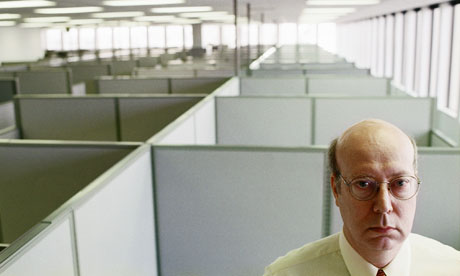
In case you still needed persuading that open-plan offices were devised by Satan himself in one of the deepest caverns of hell, the Harvard Business Review delves into new research showing just how frustrating people find them – and just how paltry, on the other side of the scale, are the benefits they bring. Using data from surveys of 42,700 American office workers, researchers Jungsoo Kim and Richard de Dear conclude that it’s not other people’s mess that bothers us the most, nor lack of personal space, nor even noise level per se, so much as a “lack of sound privacy” – hearing other people’s conversations, and perhaps equally crucially, knowing that other people can hear yours.
Anyone who’s experienced the paralysing self-consciousness of trying to conduct a sensitive phone call in the knowledge that four or five colleagues can follow every word won't be surprised by the results: almost 60% of cubicle workers and half of all those in fully open-plan offices cited lack of sound privacy as a frustration, making it the most prevalent annoyance by far. That cubicle-dwellers are even more likely to be bothered than their “partition-less” colleagues suggests it’s even worse when you can’t see who’s talking – or who might be listening in.
We already know that open-plan offices have been associated with less persistence at challenging tasks, lower motivation, higher stress and blood pressure, and more. But Kim and Dear’s work, published in the December 2013 issue of the Journal of Environmental Psychology, puts paid to any suggestion that the benefits of easy communication between workers – effortless exchange of information, useful chance conversations sparking new ideas – outweighs these irritations. Employees in private settings actually rated "ease of interaction" as better, overall, than those in open offices. Perhaps that's because it’s so hard to hold a useful conversation with one other person when half your mind’s on the question of who else might be eavesdropping?
“Our results,” the researchers conclude, “categorically contradict the industry-accepted wisdom that open-plan layout enhances communication between colleagues and improves occupants’ overall work environmental satisfaction". Even to the extent that easier communication did make open-plan offices a little less bad, for some, than they might otherwise have been, this "failed to offset the decrements by negative impacts of noise and privacy."
HBR’s Sarah Green sums things up:
I’m left with the conclusion that Virginia Woolf was right: what one really needs is simply a room of one’s own.
Of course, these studies don’t tend to focus on one other major benefit of open-plan: it’s a cheap way of cramming more people into less space. Might research like Kim and Dear’s finally begin to convince the people in charge that the strategy’s not worth it, even when considered from the coldly instrumental position of extracting as much value from workers as possible? While we wait to find out, I recommend Howard Leight Max earplugs (I’m not on commission, I’ve just tried a lot of earplugs); slightly New Agey albums of nature sounds played through headphones; and the cultivation of a generally hostile and non-responsive manner towards other nearby human beings.

